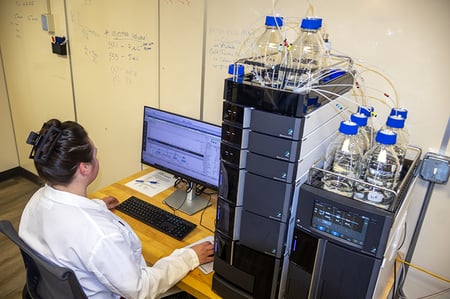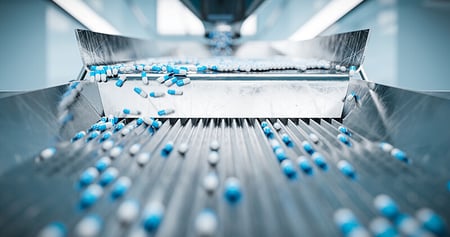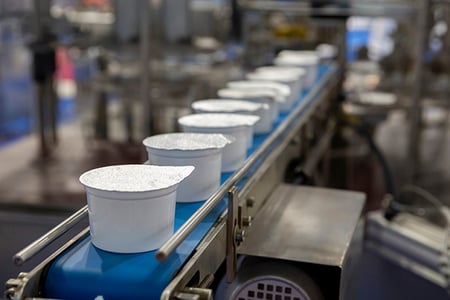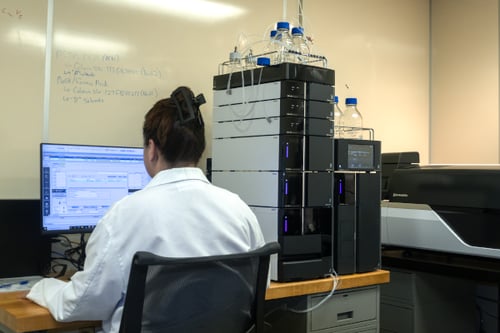Liquid Chromatography–Mass Spectrometry is a highly sensitive analytical technique used to separate, identify, and quantify chemical compounds in complex mixtures. By combining the separation power of liquid chromatography with the precise detection capabilities of mass spectrometry, LC-MS enables detailed analysis of substances ranging from pharmaceuticals and environmental pollutants to biomolecules and food additives.
Instrumentation
Liquid Chromatography–Mass Spectrometry (LC-MS)
What is LC-MS?
LC-MS (Liquid Chromatography–Mass Spectrometry) works by first separating compounds in a sample using liquid chromatography, which isolates individual components based on their chemical properties. These separated compounds are then introduced into a mass spectrometer, where they are ionized and analyzed based on their mass-to-charge ratio.
The mass spectrometer generates a spectrum that displays peaks corresponding to specific molecular ions and fragments. These peaks provide detailed information about the molecular structure, composition, and concentration of the compounds present. This allows for highly sensitive and specific identification, quantification, and characterization of complex mixtures—making LC-MS an essential tool for applications ranging from pharmaceutical analysis to environmental testing.



What Can You Do With LC-MS?
LC-MS is a powerful analytical technique used across industries for precise compound identification, quantification, and structural analysis.
- PFAS (Per- and Polyfluoroalkyl Substances)
Detect and quantify trace levels of PFAS compounds in environmental and industrial samples. Support regulatory compliance, risk assessment, and remediation efforts. - Environmental Testing
Detect trace levels of pollutants, including pesticides, PFAS, and industrial chemicals, in water, soil, and air samples. - Food Safety
Identify contaminants, additives, and residues in food products and packaging to ensure product safety and meet labeling requirements. - Biotechnology and Life Sciences
Analyze proteins, peptides, and other biomolecules in research and clinical applications with customized solutions for biomarker discovery, proteomics, and metabolomics studies. - Industrial Quality Control
Identify unknown compounds, verify formulations, and troubleshoot production issues to maintain product integrity and optimize processes.

Why Choose RJ Lee Group for LC-MS Analysis?
Our laboratory is equipped with multiple high-resolution LC-MS systems, including triple quadrupole and time-of-flight (TOF) mass spectrometers, enabling us to handle a range of tasks from routine testing to complex investigations.
-
Extensive Instrumentation
Our lab features advanced LC-MS platforms capable of both targeted and untargeted analysis, supporting trace-level detection and compound identification with high sensitivity and accuracy. -
Experienced and Skilled Staff
Our chemists and analysts bring decades of experience in method development, regulatory compliance, and investigative analysis across various industries, including pharmaceuticals, environmental science, and food safety. -
High Sample Throughput
With scalable workflows and flexible method customization, we can efficiently process large volumes of samples while maintaining data quality and turnaround time.
Get in Touch
Connect with RJ Lee Group to see how our FTIR testing services can enhance your material composition analysis. Our advanced FTIR technology accurately identifies organic and inorganic compounds, detects contaminants, and confirms material integrity for a variety of industries. Whether your focus is manufacturing, environmental science, or research and development, our FTIR analysis—integrated with elemental analysis and non-destructive testing—provides precise, dependable results designed to address your unique requirements.

Blog
Read More
10 min read
Unlocking the Secrets of Materials: The Power of X-ray Diffraction (XRD) and X-ray Fluorescence (XRF)
October 01, 2024



